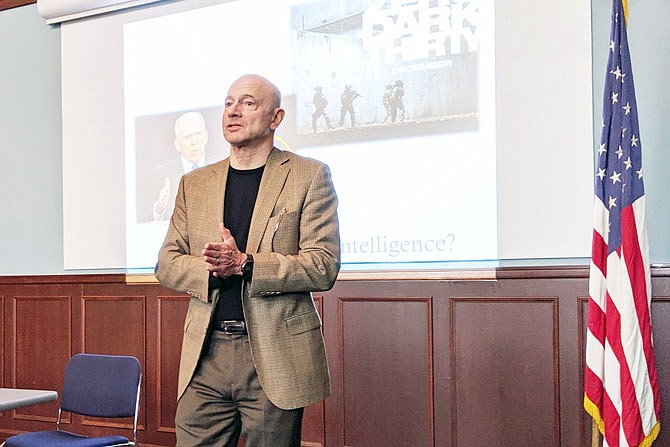Before 9/11, there was no torture debate, law scholar Craig Martin said.
"If we were talking about torture 19 years ago, it would be a very short conversation," he said. "Torture is wrong, bad and illegal, and we don't do it."
That has long been the United States' stance - one backed by a long list of international treaties and agreements. Following the coordinated terrorist attacks in 2001, something changed, Martin said. He doesn't think that change is justified.
"My thesis is that we shouldn't be having a debate on torture," he said. "It is unlawful, unethical, ineffective, contrary to the values of the United States and has too high a cost."
Martin teaches public international law, the law of armed conflict, constitutional law and professional responsibility at Washburn University in Kansas. A civil litigator for nearly 10 years in Toronto, Canada, he served as a member of the Law Society of Upper Canada and has also taught law courses at several universities. Martin served four years as a naval officer in the Canadian Armed Forces.
Black sites
Following the 9/11 attacks, the CIA established "black sites" in countries including Thailand, Poland and Lithuania. According to the majority report released in 2012 by the Senate Intelligence Committee, these sites were used as a place to interrogate suspected members of terrorist groups.
"The CIA wanted to get 'actionable intelligence,'" Martin said.
To do that, they developed so-called "enhanced interrogation techniques," reverse-engineering techniques based on a training program for resisting torture. Detainees were slammed against the walls and waterboarded; underwent sleep deprivation and mock executions; told the CIA would kill them or their loved ones; and worse, an executive summary of the Senate report states.
"The findings are fairly astonishing," Martin said. "It was detailed that 119 or more people were detained in the black sites. At times, the CIA lied to Congress about how many people they were detaining; at other times, they didn't know."
He said international law is clear on what constitutes torture and its illegality. The Convention Against Torture provides the most common definition. Its elements include the intentional inflicting of severe physical or mental pain or suffering, for one of the following purposes: punishment, to obtain info or confession, to intimidate or coerce. The torture must also be inflicted by or with the consent of a public official.
By that definition, Martin argued, the actions of the CIA following 9/11 should certainly be categorized as illegal torture.
The ethics
Most often, officials use a utilitarian argument to justify torture, Martin said. One classic thought experiment posits a situation in which, by torturing one known terrorist, one could extract the location of a hidden bomb, thus saving 10,000 people's lives.
Martin said people tend to start getting squeamish once you add a twist: What if you knew the terrorist couldn't be tortured into sharing the information, but would do so if you tortured his 10-year-old daughter in front of him?
"Creeping into the argument is the assumption that 'Well, the terrorist is a bad guy anyway, so he deserves it,"' Martin said.
The problem is, Martin said, in a real-life situation, the stars never align to allow for a pure utilitarian argument.
For one, the CIA rarely had complete information on the people they detain. Take, for example, Abu Zubayda, arrested in 2002 under suspicion of being a high-ranking member of al Qaeda. He was subjected to years of torture, including being confined in a tiny box with cockroaches for two weeks and being waterboarded 83 times in a single month. And yet, to this day, the U.S. has not formally charged him with any crimes and it appears he was never a ranking member of al Qaeda.
"He didn't have any information to give," Martin said.
For another, Martin said, there's no guarantee that information given under torture is accurate.
"I want to suggest to you that torture is not effective," he said. "It's useful for getting confessions, because if the torture is heinous enough, people will say anything they think the torturer wants to hear. The CIA's goal wasn't to get confessions; it was to get actionable intelligence."
The FBI has long maintained the most effective way to obtain accurate investigation is to use rapport-building techniques, rather than coercion. Martin pointed out that when asked if the CIA had extracted any actionable intelligence through its use of "enhanced interrogation," then-CIA director John Brennan responded it was "unknowable."
"That's an astoundingly weak defense for a policy that violated all the values for which America stands," Martin said.
That violation of ethical norms is the high cost utilitarians don't take into account when weighing the value of torture, Martin added. A government may begin by only using torture in a select few narrowly defined situations, but "it bleeds out," he said.
"It corrupts the criminal justice system in ways you can't anticipate," Martin said, pointing to the use of a "black site" for off-the-books interrogation by Chicago police.
Using torture also robs the United States of its standing as a moral authority on the world stage.
"I challenge the underlying premise that torture is in the United States' best interest," Martin said. "(The government) has created a recruiting tool for terrorists. If we're seen as hypocrites, it's not in our best interest. We have to adhere to the human rights we have championed."

